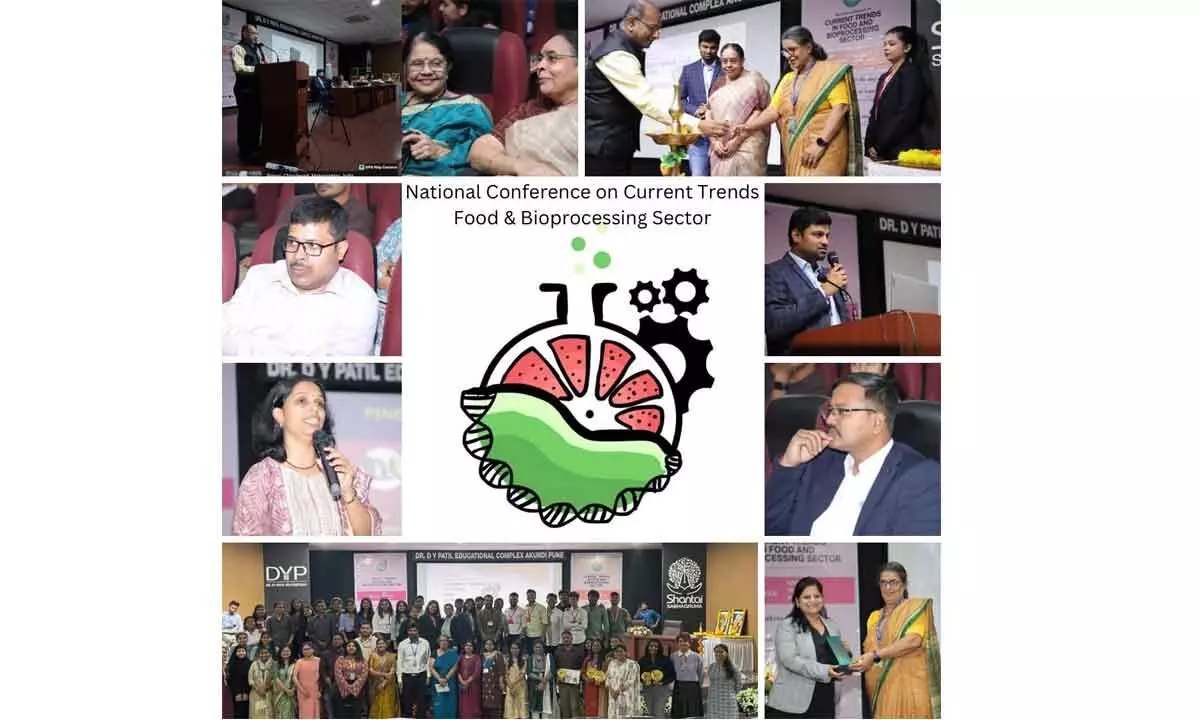India poised to become global leader in food export, bioprocessing: Expert
DY Patil University conference discusses trends in food and bioprocessing sector
image for illustrative purpose

Alternative proteins, sustainable enzymes, and entrepreneurial opportunities in food processing highlighted at conference
India may overtake Asian country like China - which currently stands the highest in food export, manufacturing, and bioprocessing.
The Vice Chancellor of DY Patil International University, Prof Prabhat Ranjan, predicted that India will excel and hopefully overtake Asian country like China - which currently stands the highest in food export, manufacturing, and bioprocessing - in the forthcoming decades and emerge as a global epicentre. He said this while addressing the inaugural session of a national conference on ‘current trends in the food and bioprocessing sector’, which was held here during 23-24 February.
The event served as a platform for academic discourse and exchange, bringing together esteemed professionals, scholars, and students from across the nation. The Director of the School of Bioengineering and the Co-convenor for the conference, Prof Shashi Singh welcomed the attendees to the university and the city and expressed hope for the awaiting discussions to be fruitful for all attendees.
In her keynote address, Dr Malathy Venkatesan, a senior chief scientist at Tata Chemicals innovation centre in Pune, reminisced the days when she taught at the Mumbai University Institute of Chemical Technology (addressed by her as UDCT - the former name of the institution) and acknowledged the university’s role in fuelling her interest in science. Her talk canvased a comparison between the consumption of alternative sugars and common sugars. It shed light on the differential metabolism of different sugars, debunked the myth of artificial sweeteners being related to better health objectively, and explained the hormonal influence over hunger, among other subjects.
Sruthi Sadanandan, the chief product strategist and founder at Altruistic Innovations and an industry expert at the conference, discussed alternative protein spaces and the burgeoning field of cultivated meat. In her talk, she elucidated the abundant scopes and job opportunities available in the domain in addition to highlighting the currently faced challenges and technological advancements in the area. Sandanandan’s talk was followed by a paper and poster presentation session.
Prof Smita Lele, a former emeritus professor at the Institute of Chemical Technology (ICT) in Mumbai inspired the audience with her discourse on ‘holistic’ research and the encouragement to investigate upon the observance of odd results with the belief that a breakthrough may be waiting to be realised underneath the observation.
The final talk for the day was delivered by the Founder & Director of Food Monk Consultants LLP in Pune, Bhagyashri Chavan. Her presentation delved into entrepreneurial opportunities in the food processing industry, the nuances of starting a food product manufacturing business, and consumers’ predilection towards healthier and minimally processed food.
The conference provided attendees with a comprehensive understanding of the latest developments and opportunities in the food sector, setting the stage for further exploration and collaboration in these fields.
The second day of the conference commenced with a talk from the chief guest and keynote speaker for the day, Dr Chiranjit Chowdhury who is a senior scientist from National Chemical Laboratory. He spoke about bacterial microcompartments and their employment as versatile and sustainable armours for enzymes against adverse conditions while they are used in bioprocessing techniques.
Dr Rahul Bhambure, a senior scientist at the National Chemical Laboratory, Pune spoke on continuous downstream processing of monoclonal antibodies. He convincingly established during his talk how continuous radial chromatography is superior to continuous axial chromatography and the wondrous increment in process productivity observed by wielding continuous radial chromatography.
Dr Jyoti Sagar Gokhale, an assistant professor at the Institute of Chemical Technology in Mumbai, spoke about integrated bioprocessing of fruit waste to produce value-added products. She discussed the products that she and her group concocted like bio-vanillin, chocolate-flavoured powder from jackfruit seeds, and several equally interesting creations and their respective manufacturing processes.
An industry expert, Dr Anbarasu Karthikaichamy, who is the associate director of R&D at Zero Cow Factory, located in Gujarat, spoke about synthetic biology and precision fermentation and delineated the many upsides and the need to adopt precision fermentation in the dairy industry for a sustainable future and to produce milk healthier than naturally drawn milk.
Dr Balakumaran - a scientist at the National Institute for Interdisciplinary Science and Technology (CSIR-NIIST) in Kerala, discussed the contemporary biotechnology industry’s expectations, opportunities in the industry and the knowledge gap potentially employable students are faced with. The talk spanned from a comprehensive strategy to search for relevant jobs and the nuances of the varied career choices to success stories of organisations that bridged the gap between graduates and industry essentials. The talk was followed by a games segment where attendees enthusiastically partook in the games ‘what’s in the box’ and ‘guess the food item with emoticons.’

